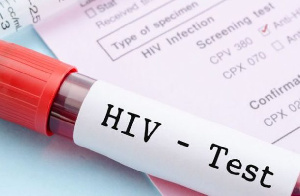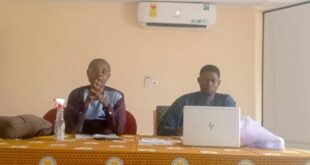The national prevalence was 1.7 per cent.
Dr Stephen Ayisi Addo, Programme Manager of NACP, who disclosed this at the fifth stakeholder engagement organized by the Ghana News Agency – Tema Regional office, explained that females formed the greater number of HIV infections mainly due to gender inequalities, adding that, one could not talk about HIV without gender issues.
He said the female reproductive tract was different from that of the male as the vaginal was a receptacle and therefore holds fluids for a long time, putting them at risk of easily contracting the virus from their partners.
The NACP Programme Manager added that females were also disadvantaged, as they did not have the ability to negotiate access to resources, saying men also have the money to buy sex rather than the woman who is selling it.
“Inequality in our gender is a major factor, a man will find it comfortable to demand for condom, but not a woman even in the marriage relationship, she is afraid that she will be accused. People think that men can keep condoms but not women,” he said.
Dr Ayisi Addo said a lot of factors including biological and socio-economic issues come into play when talking about HIV infection rates.
He stated that as part of the HIV Control Programme, NACP outfits were doing their best to eliminate transmission from mother to child by screening every pregnant woman, and those who tested positive were put on antiretroviral drugs to prevent them from passing on the virus to their unborn babies.
Dr Ayisi Addo said as part of primary prevention in the public, when a pregnant woman test positive, her partner and children would be traced, counselled and tested as there was the probability of them also being infected.
He disclosed that they were also offering services like pre-exposure prophylaxis, which allows people to take medications before a sexual act to reduce the risk of contracting HIV.
He added however that, the medication was currently not available for distribution to the public, but only key population and persons in relationships with persons living with HIV, saying, one had to meet some conditions to qualify to receive the medication from the hospitals.
He called on the public to desist from stigmatizing and discriminating against persons living with HIV as such acts could lead to them hiding and spreading the virus.
Mr Francis Ameyibor, GNA Tema Regional Manager, said the stakeholders’ engagement which takes place on the last Wednesday of every month, was a progressive media caucus platform created to give the opportunity to both state and non-state stakeholders to interact with journalists and address national issues.
Mr Ameyibor said knowledge and information on the virus was essential to preventing it from spreading, hence the GNA-Tema joining forces with the NACP to educate the public.
He said: “knowing your HIV status is key. Only when people know their status can they respond appropriately – including through reducing risky behaviour and practice safe sex.
“Such changes will require community based behavioural transformative approaches and models, user friendly and effective health services where human rights are safeguarded for all, and strong leadership at all levels”.
Mr Ameyibor noted that as a media institution, preventing the spread of HIV and AIDS was a key priority. It was in this vein that GNA-Tema was teaming up with the relevant stakeholders to address HIV in a comprehensive way both through improved health services education and information.
Other speakers: Mr Fred Asiedu-Dartey, GSA Head of Freight and Logistics who spoke on: “Emerging trends in Ghana’s maritime industry – the perspective of the Ghana Shippers Authority”.
Mr Timothy Anyidoho, Senior Staff, Lands Commission and Mr George Okwabi Frimpong, senior member of the License Surveyors Association of Ghana, who spoke on: “the authority in charge of management of stool or skin, clan or family lands; role of Customary Land Secretariat; Systems of recording and registering land and interests in land; What is electronic conveyancing; and Procedures under the Alternative Dispute Resolution Act, 201”.
 Home Of Ghana News Ghana News, Entertainment And More
Home Of Ghana News Ghana News, Entertainment And More





